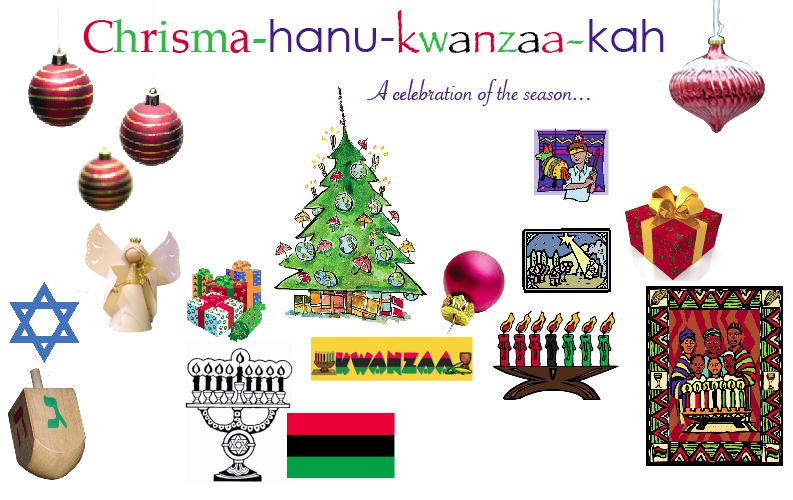Christmas
Christmas is a Christian holiday celebrated on December 25. The day marks the birth of Jesus Christ, the son of God. Christians generally celebrate by giving gifts to each other. In the United States today, Christmas is somewhat secularized, though traditionally those who celebrate it attend church on Christmas Day. It is also common for families to put up a Christmas tree. Although the origins of the Christmas tree are not exactly known, it is generally acknowledged that the tree as we know it today was established by Martin Luther as a Protestant alternative to the more traditional Catholic nativity scene. Christmas is also celebrated by the arrival of Santa Claus, a figure who brings gifts to good children on Christmas Eve, although this tradition is more secular than religious.
Hanukkah
Hanukkah is an eight-day Jewish holiday, also known as the Festival of Lights. Hanukkah is the observance of the re-dedication of the Temple in Jerusalem. The Jewish people had regained the sacred temple from their enemies. At the re-dedication in 165 BCE, there was only enough consecrated olive oil to light the eternal flame for one day. However, the olive oil lasted for eight days, at which time more consecrated olive oil was available. This miracle of the oil is observed every year.
This year Hanukkah started on December 1; however, the date varies from year to year.
Special Traditions: To observe the miracle of the oil, the menorah (a nine-branched candelabra), is lit every night. One candle is lit on the first night, and the another candle is added in succession for each of the eight days of Hanukkah.
Las Posadas
Las Posadas, meaning “the inn” in Spanish, is celebrated in Mexico and much of Central America. It is a Christian celebration in which Mary and Joseph’s journey from Nazareth to Bethlehem (and, ultimately, the stable where Jesus Christ was born) is reenacted by a community. The observance starts on December 16 and finishes on the December 24. The procession travels to different houses in each community. The procession is turned away at every house until it reaches the designated house to which the community is invited to pray and share in traditional holiday food. On the last day the procession will generally end at the church, and the people will celebrate midnight mass.
Kwanzaa
Dr. Manulana Karenga, the founder of Kwanzaa, wrote on the Official Kwanzaa website, “Kwanzaa brings a cultural message which speaks to the best of what it means to be African and human in the fullest sense.”
Kwanzaa is a celebration of “family, community and culture.” It takes place from December 26 to January 1. It was created in 1966 by Karenga to promote African American culture and to revitalize African values within the community. It is not a religious holiday, and it is stressed that Africans of any faith can “come together based on the rich, ancient and varied common ground of their Africanness,” according to the Official Kwanzaa Website.
Kwanzaa reinforces seven values of African culture: unity, self-determination, collective work and responsibility, cooperative economics, purpose, creativity and faith. These values are known as principles in Kwanzaa, and for each value there is one candle. On each day of Kwanzaa another candle is lit. The Kinara (candle holder) is placed on the Mkeka (mat) along with other symbols of African values.
Boxing Day
Boxing Day is celebrated on December 26, primarily in Australia, Canada, New Zealand and the United Kingdom. It is also known as St. Stephen’s Day. Boxing Day is a national holiday when, traditionally, Christians would share their wealth with the needy, boxing up their surplus goods and giving them to the poor, hence the name Boxing Day. Today, the holiday is more similar to Black Friday in the United States, in which stores hold huge sales and everyone gets up early to take advantage of the deals.

I enjoyed reading through and i think this website has alot really usefull stuff on it!